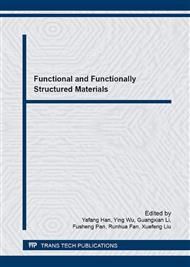[1]
H.Q. Jiang, X. Yao, J. Che, M.Q. Wang, F.T. Kong, Preparation of ZnSe Quantum Dots Embedded in SiO2 Thin Films by Sol-gel Process, Ceram. Int. 30(2004) 1685-1689.
DOI: 10.1016/j.ceramint.2004.03.030
Google Scholar
[2]
S.T. Selvan, T. Hayakawa, M. Nogami, Y. Kobayashi, L.M. Liz-Marzan, Y. Hamanaka, A. Nakamura, Sol-gel Derived Gold Nanoclusters in Silica Glass Possessing Large Optical Nonlinearities, J. Phys. Chem. B. 106(2002) 10157-10162.
DOI: 10.1021/jp020860x
Google Scholar
[3]
T.G. Mayerhofer, Z. J. Shen, E. Leonova, M. Eden, A. Kriltz, J. Popp, Consolidated Silica Slass from Nanoparticles, J. Solid State Chem. 181(2008) 2442-2447.
DOI: 10.1016/j.jssc.2008.06.011
Google Scholar
[4]
E.A. Olevsky, S. Kandukuri, L. Froyen, Consolidation Enhancement in Spark-plasma Sintering: Impact of High Heating Rates, J. Appl. Phys. 102(2007) 114913.
DOI: 10.1063/1.2822189
Google Scholar
[5]
R. Orru, R. Licheri, A.M. Locci, A. Cincotti, G.C. Cao, Consolidation/synthesis of Materials by Electric Current Activated/assisted Sintering, Mater. Sci. Eng. R-Rep. 63(2009) 127-287.
DOI: 10.1016/j.mser.2008.09.003
Google Scholar
[6]
Z.A. Munir, D.V. Quach, M. Ohyanagi, Electric Current Activation of Sintering: A Review of the Pulsed Electric Current Sintering Process, J. Am. Ceram. Soc. 94(2011) 1-19.
DOI: 10.1111/j.1551-2916.2010.04210.x
Google Scholar
[7]
J.E. Garay, Current-Activated, Pressure-Assisted Densification of Materials, Annu. Rev. Mater. Res. 40(2010) 445-468.
DOI: 10.1146/annurev-matsci-070909-104433
Google Scholar
[8]
L. Gao, J. Hong, H. Miyamoto, S. De La Torre, Superfast Densification of Oxide Ceramics by Spark Plasma Sintering, J. Inorg. Mater. 13(1998) 18-22.
Google Scholar
[9]
J. X. Zhang, K. G. Liu, M. L. Zhou, Development and Application of Spark Plasma Sintering, Powder Metall. Technol. 20(2002) 129-134.
Google Scholar
[10]
K. Vanmeensel, A. Laptev, O. Van der Biest, J. Vleugels, Field Assisted Sintering of Electro-conductive ZrO2-based Composites, J. Eur. Ceram. Soc. 27(2007) 979-985.
DOI: 10.1016/j.jeurceramsoc.2006.04.142
Google Scholar
[11]
L.J. Wang, J.F. Zhang, W. Jiang, Recent Development in Reactive Synthesis of Nanostructured Bulk Materials by Spark Plasma Sintering, Int. J. Refract. Met. Hard Mater. 39(2013) 103-112.
DOI: 10.1016/j.ijrmhm.2013.01.017
Google Scholar
[12]
S. Wei, Z.H. Zhang, X.B. Shen, F.C. Wang, M.Y. Sun, R. Yang, S.K. Lee, Simulation of Temperature and Stress Distributions in Functionally Graded Materials Synthesized by a Spark Plasma Sintering Process, Comput. Mater. Sci. 60(2012) 168-175.
DOI: 10.1016/j.commatsci.2012.03.024
Google Scholar
[13]
T.G. Mayerhöfer, Z. Shen, E. Leonova, M. Edén, A. Kriltz, J. Popp, Consolidated Silica Glass from Nanoparticles, J. Solid State Chem. 181(2008) 2442-2447.
DOI: 10.1016/j.jssc.2008.06.011
Google Scholar
[14]
O. Yong-Taeg, S. Fujino, K. Morinaga, Fabrication of Transparent Silica Glass by Powder Sintering, Sci. Technol. Adv. Mater. 3(2002) 297-301.
DOI: 10.1016/s1468-6996(02)00030-x
Google Scholar
[15]
T. Yamada, M. Nakajima, T. Suemoto, T. Uchino, Formation and Photoluminescence Characterization of Transparent Silica Glass Prepared by Solid-phase Reaction of Nanometer-sized Silica Particles, J. Phys. Chem. A. 111(2007) 12973-12979.
DOI: 10.1021/jp072312v
Google Scholar
[16]
L.J. Wang, W. Jiang, L.D. Chen, Z.J. Shen, Formation of a Unique Glass by Spark Plasma Sintering of a Zeolite, J. Mater. Res. 24(2009) 3241-3245.
DOI: 10.1557/jmr.2009.0385
Google Scholar
[17]
Y. Gong, H.R. Chen, Q.J. He, J.L. Shi, L.J. Wang, W. Jiang, Preparation of Er3+/Yb3+ Co-doped Zeolite-derived Silica Glass and Its Upconversion Luminescence Property, Ceram. Int. 39(2013) 8865-8868.
DOI: 10.1016/j.ceramint.2013.04.079
Google Scholar
[18]
S.J. Gu, X. Zhang, L.J. Wang, X.H. Gan, Z.J. Shen, W. Jiang, Direct Indication of a Higher Central Temperature Achieved during Spark Plasma Sintering Process of a Zeolite, J. Eur. Ceram. Soc. 35(2015) 1599-1603.
DOI: 10.1016/j.jeurceramsoc.2014.11.012
Google Scholar
[19]
D.Y. Zhao, J.L. Feng, Q.S. Huo, N. Melosh, G.H. Fredrickson, B.F. Chmelka, G.D. Stucky, Triblock Copolymer Syntheses of Mesoporous Silica with Periodic 50 to 300 Angstrom Pores, Science. 279(1998) 548-552.
DOI: 10.1126/science.279.5350.548
Google Scholar
[20]
D.A. Zatsepin, R.J. Green, A. Hunt, E.Z. Kurmaev, N.V. Gavrilov, A. Moewes, Structural Ordering in a Silica Glass Matrix under Mn Ion Implantation, J. Phys.: Condens. Matter. 24(2012) 185402.
DOI: 10.1088/0953-8984/24/18/185402
Google Scholar
[21]
R.L. Coble, Diffusion Models for Hot Pressing with Surface Energy and Pressure Effects as Driving Forces, J. Appl. Phys. 41(1970) 4798-4807.
DOI: 10.1063/1.1658543
Google Scholar
[22]
B. Cabal, F. Quintero, L.A. Diaz, F. Rojo, O. Dieste, J. Pou, R. Torrecillas, J.S. Moya, Nanocomposites of Silver Nanoparticles Embedded in Glass Nanofibres Obtained by Laser Spinning, Nanoscale. 5(2013) 3948-3953.
DOI: 10.1039/c3nr00638g
Google Scholar
[23]
E.M.A. Khalil, F.H. ElBatal, Y.M. Hamdy, H.M. Zidan, M.S. Aziz, A.M. Abdelghany, Infrared Absorption Spectra of Transition Metals-doped Soda Lime Silica Glasses, Physica B. 405(2010) 1294-1300.
DOI: 10.1016/j.physb.2009.11.070
Google Scholar
[24]
C. Sonneville, A. Mermet, B. Champagnon, C. Martinet, J. Margueritat, D. De Ligny, T. Deschamps, F. Balima, Progressive Transformations of Silica Glass upon Densification, J. Chem. Phys. 137(2012) 124505.
DOI: 10.1063/1.4754601
Google Scholar
[25]
H. Aguiar, J. Serra, P. Gonzalez, B. Leon, Influence of the Stabilization Temperature on the Structure of Bioactive Sol-Gel Silicate Glasses, J. Am. Ceram. Soc. 93(2010) 2286-2291.
DOI: 10.1111/j.1551-2916.2010.03733.x
Google Scholar
[26]
H. Hidai, M. Yoshioka, K. Hiromatsu, H. Tokura, Structural Changes in Silica Glass by Continuous-Wave Laser Backside Irradiation, J. Am. Ceram. Soc. 93(2010) 1597-1601.
DOI: 10.1111/j.1551-2916.2010.03615.x
Google Scholar
[27]
M. Hornfeck, R. Clasen, S. Rosenbaum, Optical Spectroscopy on Glasses Sintered from Nanosized Particles, J. Mol. Struct. 348(1995) 461-464.
DOI: 10.1016/0022-2860(95)08688-r
Google Scholar
[28]
R. Hemley, H. Mao, P. Bell, B. Mysen, Raman Spectroscopy of SiO2 Glass at High Pressure, Phys. Rev. Lett. 57(1986) 747.
Google Scholar
[29]
T.G. Mayerhoefer, Z.J. Shen, E. Leonova, M. Edén, A. Kriltz, J. Popp, Consolidated Silica Glass from Nanoparticles, J. Solid State Chem. 181(2008) 2442-2447.
DOI: 10.1016/j.jssc.2008.06.011
Google Scholar


